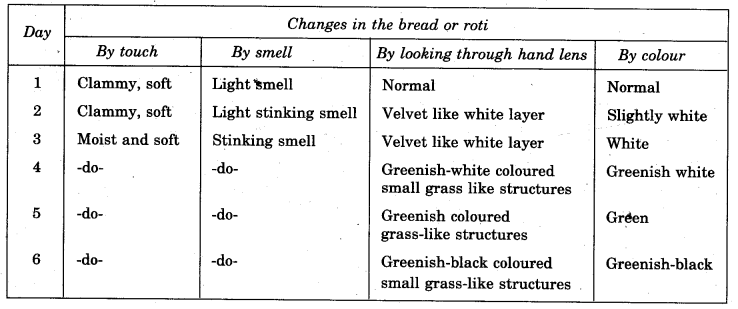NCERT Solutions for Class 5 EVS Chapter 4 Mangoes Round The Year
QUESTIONS FROM TEXTBOOK SOLVED
Discuss
1.How did Aman know that the potato sabzi had got spoilt?
Ans. The bad smell from the potato sabzi gave the clue.
2.Have you ever seen some food that has got spoilt? How did you know that it was spoilt?
Ans. Yes, I have seen foods that have gone spoilt. The spoilt food smells bad and shows unusual colours.
3.Preeti told Nitu not to eat the potato sabzi. What would have happened if she had eaten it?
Ans. She may have fallen ill if she had eaten it.
Write
1.Look in your kitchen and write down names of food items that:
(a) Can get spoilt in 2-3 days.
Ans. Milk, bread, dal, boiled rice. .
(b) Can be kept for a week.
Ans. Potato, tomato, onion, cake.
(c) Would not spoil till one month.
Ans. Flou*, raw rice, pickles, ghee.
2.Look at your friend’s list and discuss in the class.
Ans. My friend’s list also contains similar items. Most of the cooked foods get spoilt in 2-3 days. Most of the raw vegetables get spoilt in a week. Most of the dry grains can last a month and more than a month.
3.Will your list be the same in all seasons? What would change?
Ans. No, the list will change in different seasons. Food easily gets spoilt in summer
than in winter. In rainy season, the excess moisture in the air hastens the %
process of spoiling of food.
4.When food gets spoilt in your house, what do you do with it?
Ans. We throw the spoilt food in the garbage bin.
Biji Returned the Bread
1.Look at the picture of the bread packet here and guess why Biji
returned it? How did she find that the bread had got spoilt?
Ans. Biji may have found that the expiry date of the bread had lapsed.
She may have observed black-velvety spots on the bread.

Find Out
Look carefully at two-three packets of food items:
1.What can we know from what is written on the packet?
Ans. The food packet can give following information:
Price, weight, date of manufacturing, date of expiry and ingredients.
2.When you buy anything from the market, what do you look for on the packet?
Ans.I check for the dates of manufacturing and expiry. I also check for price and weight.
How Does Food Get Spoilt?:
1.The whole class can do this experiment together. Take a piece of bread or roti. Sprinkle a few drops of water on it, and put it in a box. Close the box. See the bread or roti everyday until you find some changes on it. .
Make this table on a chart paper and put it up in the classroom. Fill up the chart every day after discussing the changes seen.
Ans.

2.Find out the reason for these changes? From where did the fungus come on the bread?
Ans. These changes occurred because of rotting of bread. The spores of fungus are present in the air. When they get a moist surface and food, they begin to grow.
3.Different kinds of food items spoil due to different reasons. Some foods spoil soon, some stay good for long. List some seasons and conditions in which food spoils quickly.
Ans. The food spoils quickly in summer and rainy seasons.
Conditions in which the food spoils quickly:
– If cooked food is kept in open.
– If milk is not boiled properly.
– If green vegetables are kept in hot and humid places.
– If pickles are not protected against moisture.
4.Given below are some food items and some simple methods by which these could be kept fresh for 1-2 days. Match the correct pairs:

Ans.

Write
1.Why was sugar and jaggery mixed into the mango pulp and dried in the sun?
Ans. To make mamidi tandra (aam papad).
2.Why did Appa first choose the most ripe mangoes to be used for making the mamidi tandra?
Ans. Ripe mango contains more juice and less fibres. Hence, Appa first chose the most ripe mangoes to be used for making the mamidi tandra.
3.How did the brothers make the mamidi tandra? Write down step-by-step what they did for this.
Ans. The brothers bought following things from the market:
1. Mat made from palm leaves, casuarinas poles, string made of coconut husk, jaggery and sugar.
2. They made a platform from casuarinas poles and mat.
3. Mango juice was taken out and filtered through a fine cloth to remove fibres.
4. A thin layer of juice was spread on the mat and left to dry
5. In the evening the layer was covered with a sari to prevent dust from getting on it.
6. Every day, layer upon layer was added.
7. After about four weeks a thick golden cake of mamidi tandra could be made.
4.What things are made in your house from ripe and unripe mangoes?
Ans. In my house, pickles and chutneys are made from unripe mangoes. Aam papad is made from ripe mangoes. Mango shake is also made from ripe mangoes.
5.Make a list of all the different types of pickles that you know about.
Ans. Pickles are made of following items:
Mango, amla, chilli, lemon, Jacfruit, carrot, radish, potato, etc.
Find Out and Discuss
1.Is there any kind of pickle made in your house? What kind of pickle is it? Who makes it? From whom did they learn to make the pickle?
Ans. There are many kinds of pickle made in my house. They are made from mango, chilli, lemon and jackfruit. My mother makes these pickles. She learnt it from my grandmother.
2.What all things are needed to make any one type of pickle in your house? How is the pickle made? Find out the recipe and write.
Ans. Let us take example of mango pickle. Following things are needed to make salty mango pickle:
Raw mangoes, turmeric powder, red chilli powder, coriander powder, mustard seeds, aniseed, methi, kalaunji, salt, oil, etc.
Process: Raw mango is cut into small pieces and washed. It is sundried for a day to remove some moisture. All the spices are mixed with raw mangoes. Then the mixture is put in glass or porcelain jar. Oil is poured so that the pickle mixture gets submerged in oil. This is left in sunshine for about a week.
3.How are these things made in your house?
(i) Papad (it) Chutney (iii) Badiyan
Ans. Papad is made from different kinds of lentils and also from potatoes. For example; urad papad is made by grinding the urad dal and mixing it with salt and other spices. A dough is then made. Thin papad is rolled out from the dough. This is left in the sun for drying.
Chutney is made from many things, but chutney of dhania and mirchi is very popular. Lots of coriander leaves and some green chilli are ground in a fine paste. Salt is added as per taste. This chutney is normally eaten fresh. It can also be preserved for some days by adding oil in it.
Badiyan are made from urad. Urad grains Eire soaked overnight in water and then ground into a coarse paste. Salt and spices are added as per taste. The small lumps are made on a cloth and left to dry in the sun.
4.It is a two-day journey by train from Pune to Kolkata. If you were to go on this trip, what food items would you carry with you? How would you pack them? Make a list on the blackboard of all the packed food. What food would you eat first?
Ans. I will carry those items which do not get spoiled easily. I will pack them in dry containers and packets.
I will carry biscuits, chips, dry fruits, dry sweets, sattu (gram powder), curd, chiwda (rice flakes), murmure (puffed rice), puri, dry sabji, etc.
I will first try to finish puri and sabji because they can get spoiled in a few days.
What We Have Learnt
1.Glass jars and bottles are dried well in the sun before filling them with pickles. Why is this done? Do you remember what happened to the bread in the experiment?
Ans. Glass jars and bottles are dried well in the sun to remove any moisture. In the experiment with bread, the bread got spoiled because of moisture and fungus grew on it.
2.To eat mangoes round the year we make different items like pickles, aam papad, chutney, chikky, etc. List some other food with which we make different things, so that we can enjoy it throughout the year.
Ans. Following are examples of food which can be enjoyed throughout the year:
(a) Pickles are made from many things.
(b) Many vegetables; like cauliflower; are sun dried for later use.
(c) Potato chips and banana chips are made so that they can last longer.
(d) Murabba is prepared from white gourd and amla.
(e) Peda is made from milk.
NCERT SolutionsEVSMathsEnglishHindiParyavarana Adhyayan